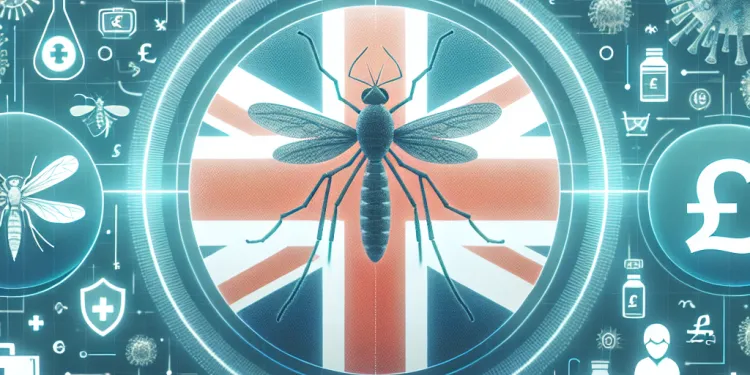
Find Help
More Items From Ergsy search
-

Is Zika virus present in the UK?
Relevance: 100%
-

Is there a vaccine for the Zika virus?
Relevance: 98%
-

Does the UK have Zika virus?
Relevance: 95%
-

Is Zika virus screened for in blood transfusions?
Relevance: 95%
-

Should UK travelers be concerned about Zika virus?
Relevance: 92%
-

Are UK mosquitoes capable of transmitting Zika virus?
Relevance: 92%
-

What are the symptoms of Zika virus?
Relevance: 91%
-

How is the Zika virus transmitted?
Relevance: 90%
-

Can Zika virus affect pregnancy?
Relevance: 89%
-

Are there any Zika virus outbreaks currently?
Relevance: 88%
-

Is the UK government providing guidance on Zika virus for travelers?
Relevance: 86%
-

Where can I find the latest updates on Zika virus risk areas?
Relevance: 85%
-

Can men in the UK transmit Zika virus if infected?
Relevance: 84%
-

Can Zika virus be spread from person to person in the UK?
Relevance: 82%
-

What should someone from the UK do if they think they have Zika virus after traveling?
Relevance: 76%
-

What precautions should pregnant women in the UK take regarding Zika virus?
Relevance: 76%
-

Can Nipah Virus cause outbreaks?
Relevance: 70%
-

How can UK residents protect themselves from Zika virus when traveling?
Relevance: 70%
-

How is Nipah Virus controlled during outbreaks?
Relevance: 67%
-

Has Marburg virus caused any major outbreaks?
Relevance: 65%
-

What regions are most at risk for Nipah Virus outbreaks?
Relevance: 65%
-

Are there any countries at higher risk for Marburg virus outbreaks?
Relevance: 65%
-

How do health authorities confirm a Marburg virus outbreak?
Relevance: 65%
-

What measures are being taken to control Marburg virus outbreaks?
Relevance: 64%
-

Why are Nipah Virus outbreaks considered a public health concern?
Relevance: 62%
-

What other viruses are tested for in blood donations?
Relevance: 52%
-

Is the Marburg virus related to the Ebola virus?
Relevance: 52%
-

What is Chikungunya virus infection?
Relevance: 52%
-

Where do Chikungunya outbreaks typically occur?
Relevance: 51%
-

What is the Marburg Virus?
Relevance: 51%
-

What is Nipah Virus?
Relevance: 50%
-

Is there a vaccine for Marburg virus?
Relevance: 49%
-

Are measles outbreaks common in the UK?
Relevance: 49%
-

Is there a cure for Nipah Virus?
Relevance: 49%
-

What triggers a cold sore outbreak?
Relevance: 49%
-

What is the Ebola virus?
Relevance: 49%
-

Where was Nipah Virus first identified?
Relevance: 49%
-

Where was the Marburg virus first discovered?
Relevance: 48%
-

How is Chikungunya virus transmitted?
Relevance: 47%
-

How is Chikungunya virus infection diagnosed?
Relevance: 47%
Understanding Zika Virus
Zika virus is a mosquito-borne flavivirus that was first identified in Uganda in 1947. It is primarily transmitted through the bite of an infected Aedes species mosquito, which is also known to spread dengue and chikungunya viruses. The virus can also be transmitted through sexual contact, blood transfusion, and from a pregnant mother to her baby. Symptoms of Zika infection are usually mild, including fever, rash, conjunctivitis, and joint pain. However, the virus is associated with serious birth defects, such as microcephaly, when contracted during pregnancy, and it can also lead to neurological complications in adults.
Current Global Situation
As of the latest data up to October 2023, there are no significant Zika virus outbreaks reported globally. Previous major outbreaks occurred in 2015-2016, with widespread cases across the Americas, including Brazil. These outbreaks led to global concerns due to the associated increase in congenital Zika syndrome cases. However, since then, the number of cases has dropped significantly due to combined efforts in mosquito control, public health campaigns, and increased awareness. Currently, cases of Zika are sporadic and largely contained within regions where the Aedes mosquito is endemic, such as parts of South and Central America, Southeast Asia, and Pacific Islands.
UK Travel Advice
For individuals traveling from the UK to regions where Zika virus transmission is possible, it is recommended to take precautions to prevent mosquito bites. Travelers should use insect repellent, wear long sleeves and trousers when outdoors, and sleep under mosquito nets if accommodation is not well-screened. Pregnant women are advised to postpone non-essential travel to areas with active Zika transmission, given the risk to the fetus. The UK government regularly updates travel health advice, and travelers should consult the NHS Fit for Travel website or Public Health England for the latest guidance on Zika virus and other health concerns.
Public Health Considerations
In the UK, the risk of a Zika virus outbreak is considered very low due to the absence of the Aedes species mosquito. Public health efforts are primarily focused on educating travelers and healthcare professionals about the risks and prevention strategies associated with Zika virus. Vigilance is maintained through surveillance and monitoring systems to quickly identify and respond to any potential cases. Research continues into vaccine development and understanding the full impact of Zika virus infections. The reduced incidence of Zika virus cases globally is hopeful, but continued awareness and prevention measures are essential to prevent future outbreaks.
Understanding Zika Virus
Zika virus is a germ spread by mosquitoes. It was first found in Uganda in 1947. Mosquitoes that carry Zika also spread other germs like dengue and chikungunya. People can get Zika from mosquito bites, sexual contact, blood transfusions, and from mother to baby during pregnancy. Zika symptoms are usually mild. They include fever, rash, red eyes, and joint pain. However, if a pregnant woman gets Zika, it can cause serious birth defects like a small head size in babies. Adults can also have nerve problems from Zika.
Current Global Situation
As of October 2023, there are no big Zika outbreaks in the world. Big outbreaks happened in 2015-2016, especially in the Americas like Brazil. These outbreaks worried many because they caused more babies to be born with problems. Now, there are fewer cases because of efforts to stop mosquitoes and teach people about Zika. Today, Zika cases are rare and mostly happen where the Aedes mosquito lives, such as South and Central America, Southeast Asia, and Pacific Islands.
UK Travel Advice
If you are traveling from the UK to places with Zika, protect yourself from mosquito bites. Use bug spray, wear long sleeves and pants, and sleep under bed nets if your room isn't sealed. Pregnant women should avoid traveling to places with Zika because it can harm the baby. The UK government often updates travel health advice. For the latest news, check the NHS Fit for Travel website or Public Health England.
Public Health Considerations
The UK has a very low chance of a Zika outbreak because it doesn't have the Aedes mosquito. The UK focuses on teaching travelers and doctors about Zika. They watch for any Zika cases to act quickly. Scientists keep working on vaccines and learning more about Zika. Even though there are fewer Zika cases now, we still need to be careful to prevent future outbreaks.
Frequently Asked Questions
Useful Links
This website offers general information and is not a substitute for professional advice.
Always seek guidance from qualified professionals.
If you have any medical concerns or need urgent help, contact a healthcare professional or emergency services immediately.
Some of this content was generated with AI assistance. We’ve done our best to keep it accurate, helpful, and human-friendly.
- Ergsy carfully checks the information in the videos we provide here.
- Videos shown by Youtube after a video has completed, have NOT been reviewed by ERGSY.
- To view, click the arrow in centre of video.
- Most of the videos you find here will have subtitles and/or closed captions available.
- You may need to turn these on, and choose your preferred language.
- Go to the video you'd like to watch.
- If closed captions (CC) are available, settings will be visible on the bottom right of the video player.
- To turn on Captions, click settings .
- To turn off Captions, click settings again.
More Items From Ergsy search
-

Is Zika virus present in the UK?
Relevance: 100%
-

Is there a vaccine for the Zika virus?
Relevance: 98%
-

Does the UK have Zika virus?
Relevance: 95%
-

Is Zika virus screened for in blood transfusions?
Relevance: 95%
-

Should UK travelers be concerned about Zika virus?
Relevance: 92%
-

Are UK mosquitoes capable of transmitting Zika virus?
Relevance: 92%
-

What are the symptoms of Zika virus?
Relevance: 91%
-

How is the Zika virus transmitted?
Relevance: 90%
-

Can Zika virus affect pregnancy?
Relevance: 89%
-

Are there any Zika virus outbreaks currently?
Relevance: 88%
-

Is the UK government providing guidance on Zika virus for travelers?
Relevance: 86%
-

Where can I find the latest updates on Zika virus risk areas?
Relevance: 85%
-

Can men in the UK transmit Zika virus if infected?
Relevance: 84%
-

Can Zika virus be spread from person to person in the UK?
Relevance: 82%
-

What should someone from the UK do if they think they have Zika virus after traveling?
Relevance: 76%
-

What precautions should pregnant women in the UK take regarding Zika virus?
Relevance: 76%
-

Can Nipah Virus cause outbreaks?
Relevance: 70%
-

How can UK residents protect themselves from Zika virus when traveling?
Relevance: 70%
-

How is Nipah Virus controlled during outbreaks?
Relevance: 67%
-

Has Marburg virus caused any major outbreaks?
Relevance: 65%
-

What regions are most at risk for Nipah Virus outbreaks?
Relevance: 65%
-

Are there any countries at higher risk for Marburg virus outbreaks?
Relevance: 65%
-

How do health authorities confirm a Marburg virus outbreak?
Relevance: 65%
-

What measures are being taken to control Marburg virus outbreaks?
Relevance: 64%
-

Why are Nipah Virus outbreaks considered a public health concern?
Relevance: 62%
-

What other viruses are tested for in blood donations?
Relevance: 52%
-

Is the Marburg virus related to the Ebola virus?
Relevance: 52%
-

What is Chikungunya virus infection?
Relevance: 52%
-

Where do Chikungunya outbreaks typically occur?
Relevance: 51%
-

What is the Marburg Virus?
Relevance: 51%
-

What is Nipah Virus?
Relevance: 50%
-

Is there a vaccine for Marburg virus?
Relevance: 49%
-

Are measles outbreaks common in the UK?
Relevance: 49%
-

Is there a cure for Nipah Virus?
Relevance: 49%
-

What triggers a cold sore outbreak?
Relevance: 49%
-

What is the Ebola virus?
Relevance: 49%
-

Where was Nipah Virus first identified?
Relevance: 49%
-

Where was the Marburg virus first discovered?
Relevance: 48%
-

How is Chikungunya virus transmitted?
Relevance: 47%
-

How is Chikungunya virus infection diagnosed?
Relevance: 47%


